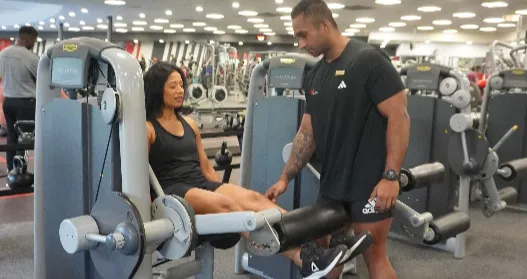
Personal trainer Rahul Govender with client Chantal Govender. The exercise is a leg extension primarily used to strengthen the muscles in the quadriceps (quads) - a group of four muscles located at the front of your thigh. It's one of the largest muscles in the body and plays a major role in walking, running, jumping and stabilising the knee.
Image: Supplied
MANY women start noticing that the things that used to work for fat loss in their 20s no longer do the trick after 35. The scale moves slower, the body feels different, and frustration quickly sets in.
But don't let this get you down. the body naturally changes with time, and here are 5 points to help you understand why.
1. Hormonal changes and metabolism shifts: after 35, oestrogen and progesterone levels begin to fluctuate. These hormones play a big role in how your body stores fat, especially around the stomach and hips. As oestrogen drops, fat distribution changes and the body tends to hold onto fat more easily. Along with that, your resting metabolism or BMR (the number of calories your body burns at rest) starts to decline by about 1 to 2% per decade. That means if you eat the same and move the same as you did at 25, your body may now be storing more than it burns.
2. Loss of muscle mass: most people don't realise that muscle is metabolic, meaning it burns calories even when you are not moving, whereas cardio will only burn calories at that time. But from mid-30s onward, women can start losing about 3 to 5% of muscle mass per decade if they are not strength training. Less muscle is equal to fewer calories burned daily and slower fat loss. This is one reason I always encourage my female clients to lift weights at a minimum of three times a week. Building lean muscle not only tightens and tones the body, it also recharges your metabolism and keeps your joints strong as you age.
3. Lifestyle overload and chronic stress: most women these days are juggling careers, families, and endless responsibilities. The result? High stress levels and little time for self-care. Chronic stress raises cortisol (the “stress hormone”), which can increase cravings, disrupt sleep, and cause the body to store fat, especially around the midsection. When I work with clients in this age group, we don’t just focus on workouts. We also focus on stress management, better sleep, and recovery, because fat loss doesn’t happen when your body constantly feels under threat.
4. Eating less is not always the answer: many women respond to weight gain by eating less and sometimes far less because they fear putting on more weight. But severe calorie restriction can backfire. The body adapts by slowing metabolism even further, burning fewer calories to conserve energy. Instead of extreme dieting, focus on balanced nutrition: lean proteins to preserve muscle, complex carbs for steady energy, and healthy fats for hormone support.
5. What really works after 35: the truth is, fat loss after 35 is still 100% possible, it just requires a smarter approach. Here’s what I tell my clients:
- Strength train at least three times a week. Lifting weights is the fastest way to rebuild lost muscle and reignite your metabolism.
- Get enough protein. Aim for at least 1.2 to 1.6g per kg of body weight per day.
- Prioritise sleep and recovery. Poor sleep throws hormones out of balance and increases cravings.
- Be patient and consistent. Results take longer now, but they do come with time and discipline.
- Quick fixes don't last. Small daily changes consistently will beat intensity anytime.
Final thoughts:
Weight loss after 35 is not about fighting your body, it’s about understanding it. When you work with your changing metabolism and hormones, not against them, you will see results that last. It’s not about chasing the body you had at 25, it’s about building the strongest, healthiest version of yourself today.

Rahul Govender
Image: Supplied
Rahul Govender is an elite personal trainer at Virgin Active and an online fitness coach helping beginners transform their bodies with simple, sustainable methods. Email: [email protected]
Related Topics: